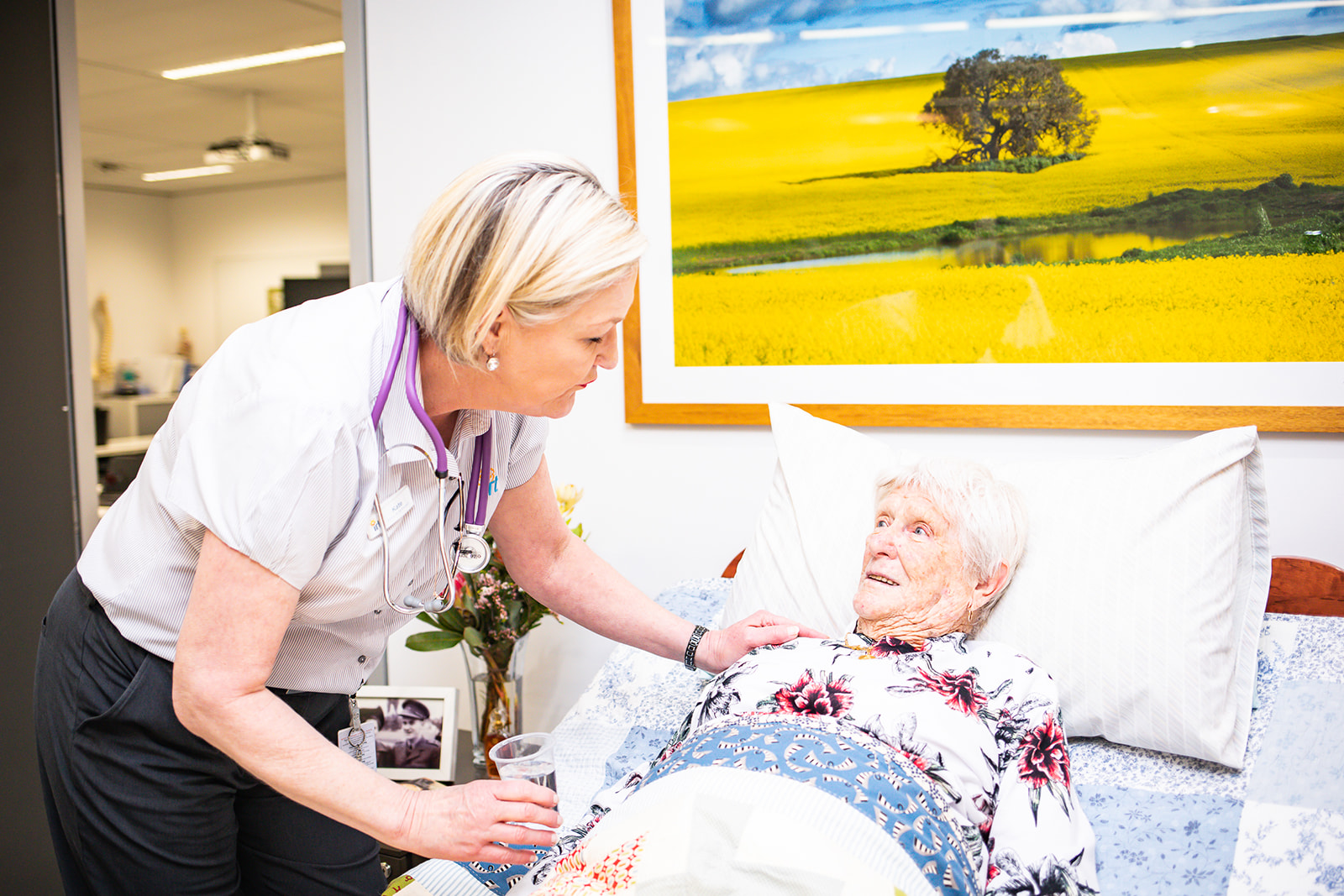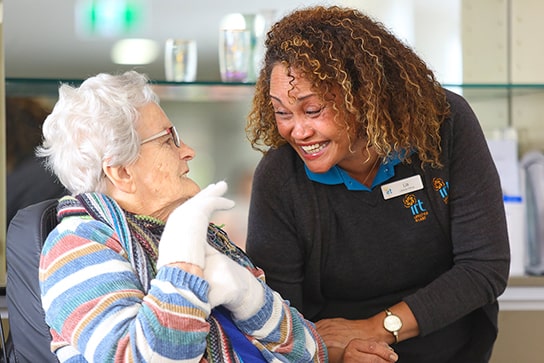Music therapy in aged care: what you need to know
Music therapy is beneficial for people with a wide range of health concerns, including people with dementia and brain injuries.
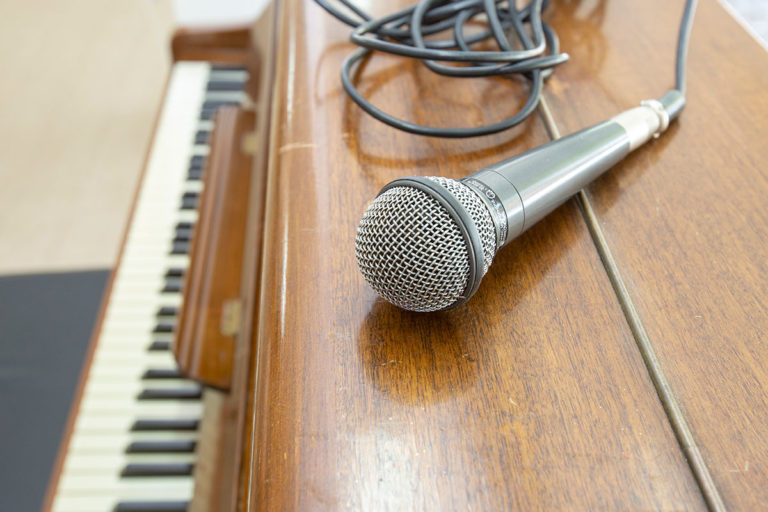
Music is an integral part of daily life. Turning on the radio while driving, listening to our favourite tunes while cooking or creating a playlist to motivate ourselves during exercise is second nature for many of us.
Music plays a fundamental role in our identity, culture and heritage and can evoke powerful memories and emotions.
It can also have a strong influence on our mindset and wellbeing. It makes the practice of ‘music therapy’ a great tool for relieving a range of health conditions, including dementia.
What is music therapy?
Music therapy, as a profession, originated in the 1950s to help relieve the physical and emotional trauma experienced by war veterans. The demand for trained professionals steadily grew and, as a result, the Australian Music Therapy Association (AMTA) was established in 1975.
AMTA defines music therapy as “a research-based practice and profession in which music is used to actively support people as they strive to improve their health, functioning and wellbeing”.
Music therapy is beneficial for people with a wide range of health concerns, including people with dementia and brain injuries.
It is a diverse practice encompassing a variety of techniques but it is based on two fundamental methods. The receptive method involves listening, while the active method focuses on playing musical instruments.
Music therapists work with people of any age and ability, culture and background. They will set out specific objectives and implement a tailored plan to help the individual achieve their goals. Common goals in music therapy include the development of:
- Communication skills (using vocal/verbal sounds and gestures)
- Social skills (making eye contact, turn-taking, initiating interaction, and self-esteem)
- Sensory skills (through touch, listening, and levels of awareness)
- Physical skills (fine and gross motor control and movement)
- Cognitive skills (concentration and attention, imitation, and sequencing)
- Emotional skills (expression of feelings non-verbally).
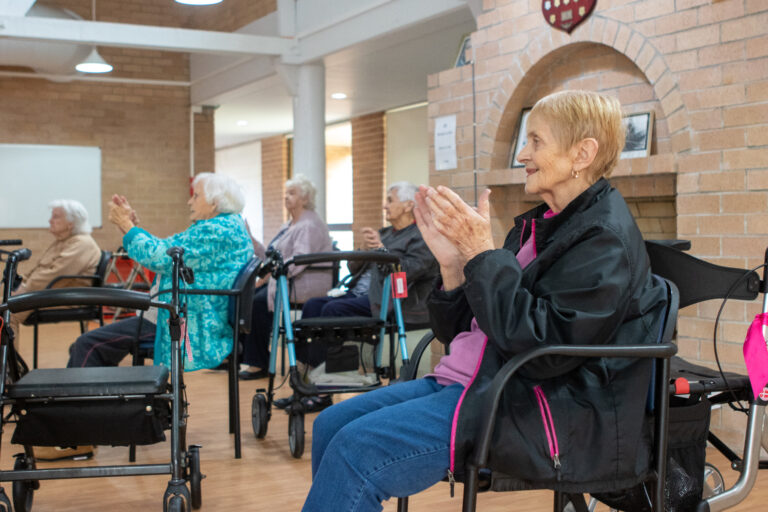
Music plays a fundamental role in our identity, culture and heritage and can evoke powerful memories and emotions.
What are the benefits of music therapy?
There are many proven benefits of music therapy, including:
1. Reduced anxiety and physical effects of stress
Music has the ability to relive emotional and physical stress, especially when combined with movement or stimulation of different sensory paths.
2. Improved healing
It’s suggested that music can positively alter the release of stress hormones that help neurological, immune and respiratory function involved in healing.
3. Management of Alzheimer’s disease
Studies have shown that music therapy can have a positive effect on motor improvement, control of emotional functions, improvements in daily activities and overall improved quality of life.
4. Reduced depression and other symptoms in older people
Along with physical benefits for older people, music therapy can improve social, psychological, intellectual and cognitive performance. Both active and passive music therapy can improve mood and provide a sense of relief for caregivers.
5. Improved self-expression and communications
For those with physical disabilities, music therapy can help stimulate responses and improve verbal and non-verbal responses.
Music therapy for older people
Music therapy can play an important role in the care of older people, with many of the 400+ registered music therapists in Australia working in aged care settings.
It can help seniors and people living with dementia express their feelings, communicate with others and prompt memories through listening, singing, song writing or playing an instrument.
Common methods used by music therapists include playing live or recorded music, facilitating song choice, active music making and improvisation and ‘musical life review’ where the person and/or their loved ones make a compilation of music that is meaningful to them.
There is also a special technique that is used by therapists in which music is improvised to match and slow a person’s breathing rate to help reduce the need for medication.
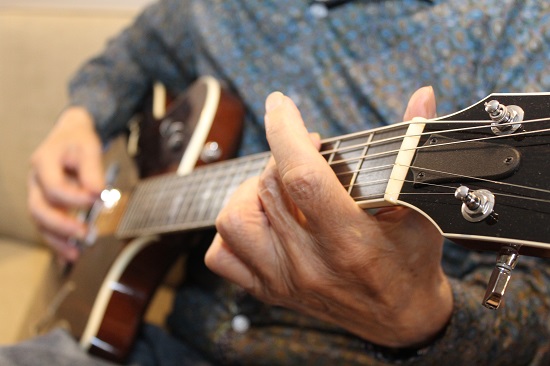
How can music therapy help people with dementia?
The use of music therapy for people with dementia is a well-researched phenomenon. Dementia causes changes in cognitive functions, including decision making, judgement, memory, special orientations, reasoning and verbal communication. Dementia is also linked to behavioural and personality changes, depending on the areas affected in the brain.
In people living with dementia, music therapy can awaken parts of the brain that are not impacted by dementia. It can evoke responses such as singing or humming and even moments of reconnection with loved ones.
Professor Felicity Baker, the Head of Music Therapy at the University of Melbourne, uses singing and songwriting to ease the behavioural and emotional symptoms of dementia.
“When you hear a piece of music and then the memories become evoked as a result of that, the neural network is activated, and it also then leads to the activation of more positive moods,” she says.
“One of the beautiful things about music is that it takes participants in an agitated state back to safe and pleasurable memories, helping to bring them out of their shells.”
Prof Baker says older people tend to remember, and have the most connection with, music from their late teens and early 20s.
“The music stimulates those memories and with those memories comes language. If they’re in early-stage dementia, and more cognitively able, we might start with dialogue around their life and connection with music.”
In a 10-week pilot study in Melbourne in 2017, Prof Baker’s team monitored the benefits of music therapy for a group of aged care residents living with dementia.
She found the progress can be marked.
“Participants are calmer, better-engaged with other people, and seemingly happier,” she said at the time.
Prof Baker is now leading an international study on the effects of home-based music interventions on people living with dementia. Called Homeside, the project is funded by a $4 million grant from the EU Joint Programme on Neurodegenerative Disease Research.
Homeside is training family carers in Australia, the United Kingdom, Norway, Poland and Germany to use music interventions to manage behavioural and psychological symptoms of dementia.
“What we want to do is observe how the use of music positively transforms their behaviour and enables them to connect more with their family members, and creates a less stressful environment,” Prof Baker said.
“We’re also wanting to study the impact of the music engagement activities on the carers themselves because we know if we look after the carers, they’ll do a better job of looking after the people they’re caring for.”
Another study, from the Anglia Ruskin University in Cambridge, found residents with dementia who underwent music therapy saw improvements to their symptoms.
The study took place in two care homes, both with a music therapy group and control group who did not participate in music therapy. All groups consisted of residents who had some form of dementia.
In addition to standard care, participants in the intervention group received 1:1 music therapy once a week, over a period of five months. The group showed improvements in their dementia symptoms and wellbeing, as well as a decline in disruptiveness to staff.
The control group showed a decline in all three areas during the course of the trial and afterwards.
The study is published online by the journal BMC Geriatrics.
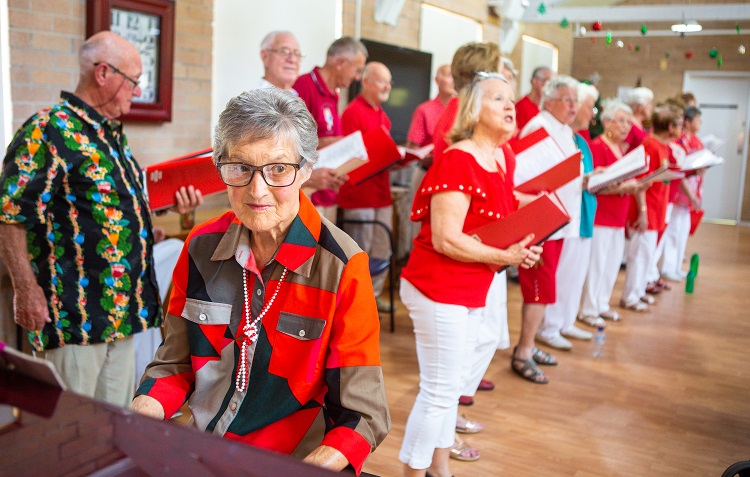
IRT and music therapy
A number of IRT aged care centres utilise some form of music therapy, resulting in a positive experience for residents and staff.
At IRT Woodlands the residents receive fortnightly visits from a music therapist where they listen to music to promote relaxation. The music therapist runs this session along with visiting the secure dementia unit for a session of music therapy.
IRT Woodlands Hospitality Manager Janelle Robinson has noticed a difference in resident behaviour since they started music therapy sessions a year ago.
“I have definitely noticed the residents are more relaxed. The dementia patients have become a lot calmer and everyone really enjoys the sessions.”
IRT Woodlands also has an intergenerational Sing Out Loud program where young students from a close-by primary school visit the aged care centre to meet the residents and sing together.
Other IRT sites facilitate their own music experience to engage residents.
IRT Macarthur meets with residents and their families to create a personalised playlist that is customised to meet each resident’s music taste. They can take this playlist and a speaker to their room or around the centre and listen as they please.
They also use visual cues so the resident can feel more immersed in the experience. For example if someone is listening to the Beatles, a picture of the Beatles is shown in front of them resulting in better recollection.
Macarthur Lifestyle Team Leader Yvette Connolly says a number of residents really enjoy having their own playlist to listen to.
“The residents really love it and their families thinks it’s a great idea too.”
How to become a music therapist
For a person to become a music therapist they must complete an approved music therapy program. In Australia there are only a handful of universities that offer accredited courses.
After completing the course, the individual will have to register with the AMTA to become an accredited music therapist.
Music therapists can work in a range of places including hospitals and aged care centres to deliver personalised programs to meet individual needs.
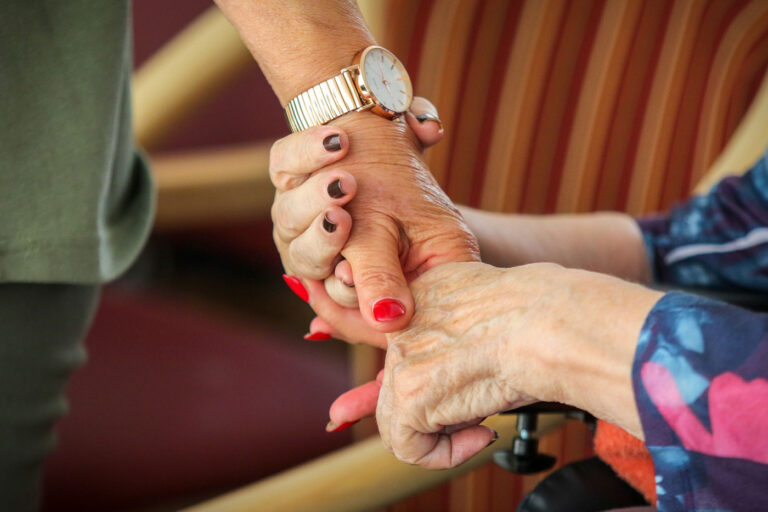
Does your loved one need support?
IRT has been supporting older Australians and their families with compassionate care for more than 50 years with aged care centres in NSW, Qld and the ACT. If your loved one needs warm and personalised care you can trust, we'd be more than happy to help.
Find out moreSubscribe to our newsletter
You may also like
Palliative care vs end of life care: what's the difference?
What is palliative care? People think palliative care is the end of someone’s life, but there’s so much more to it.
Choosing an Aged Care Centre: What to consider
Moving from your home into a residential aged care centre can be a rewarding experience for you or your loved one.

